Frequently Asked Questions

Who is Bao Dai?
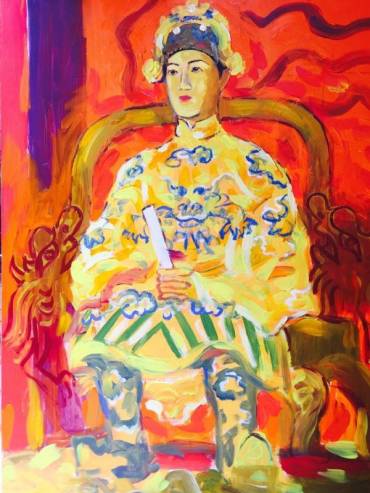
Emperor Bao Dai’s life covered four significant periods – as the Emperor of Annam, advisor to Ho Chi Minh, Chief of the Vietnam State and exile and burial in France.
During the French protectorate, Vietnam was divided into three regions – the north (Tonkin) with Hanoi as the capital, the centre (Annam) with Hue as the capital, and the south (Cochinchine) with its capital Saigon.
Together with Laos and Cambodia this region formed the so-called French Indochine. Bao Dai was the Emperor of Annam and was based in Hue; he remained the spiritual Emperor of the whole of Vietnam.
Vietnam’s last Emperor, Nguyen Vinh Thuy, came to the throne in 1926 as Bao Dai or “Keeper of Greatness” after the death of his father Emperor Khai Dinh in 1925. Educated in France he was not allowed to carry out the reforms he wished, and after the Japanese occupation declared the independence of the Empire of Vietnam on 11 March 1945.
However, the country was soon engulfed by the August Revolution led by the Communist Viet Minh and their leader Ho Chi Minh. Later in 1945 Bao Dai abdicated as Emperor and accepted the invitation of President Ho Chi Minh to be his advisor to the new government of the Vietnam Democratic Republic.
Bao Dai then left on a diplomatic mission to China and decided to stay in Hong Kong until 1949. With the start of the Indochina war, backed by the French State, he later returned to lead the Saigon-based State of Vietnam as the Chief of State. His capital was in Dalat and his administration covered the whole of the Central Highlands.
In 1955 he was overthrown in a rigged election by his U.S.-backed Prime Minister, Ngo Dinh Diem. He lived in exile in France until his death in a military hospital in Paris in 1997. Together with Emperor Duy Tan, Bao Dai is one of only two emperors of the Nguyen Dynasty not buried in Vietnam.
Is there any risk that Emperor Cruises may cancel the cruise?
The Emperor Cruises never makes the decision to cancel a cruise. However, cruising and sailing in Nha Trang Bay is strictly regulated by a local board: the Nha Trang Port Authority. Every morning, the Port Authority delivers a permit to each cruise company allowing them to sail in Nha Trang Bay. Both day cruises and overnight cruises are regulated this way.
In case of bad weather conditions and risks of tropical storms, the Port Authority might limit the possibilities of cruising and even decide to cancel all cruises.
In those cases, final decision by the Port of Authority is usually known only at 01:00 on the day of departure.
The Emperor Cruises would inform their guests as soon as the information available, which unfortunately might only be upon guest’s arrival at the port. Different possibilities are then offered to the guests.
Is it possible to be three people in the same room?
The Emperor Cruises have Triple Cabins. We can arrange one extra bed per cabin on the cruises for children under 12 years old. Above this age limit, an extra cabin will have to be booked.
Where is the Emperor Cruising inside the Halong Bay?
Our Cruises thus are navigating on more peaceful waters as the majority of the Halong cruisers take a completely different route. We try to provide a good balance between leisurely cruising away from the crowd and visits to the major landmarks of the Bay so that our guest wouldn’t miss anything of this fantastic area.
What should I wear on the boat?
No dress code is imposed on board The Emperor Cruises. We advise you that
Guests should dress comfortably in casual clothing and bring along:
+ Camera and/or video recorder
+ A swimsuit on sunny days
+ A sweater (for cooler days or evenings)
+ A cap or hat, Suntan lotion.
Weather and sea conditions can change quickly and guests are advised to take an extra t-shirt in case they get wet.
When Is The Best Time to Visit?
Halong Bay and Bai Tu Long Bay can be visited all year round. The best time to visit is September to April. Expect hot weather and some tropical rain in the summer from May to August, but the sun and blue skies reappear after the rain before a magical sunset and the moon rising high into the night sky. Be a King for a night with us on board Emperor Cruises where our team ensures you enjoy every experience whatever the weather conditions.
How to Get There?
Self-drive car hire is not available for short-term visitors to Vietnam so most travelers to Halong Bay usually book a cruise package, which includes a private car with chauffeur driver or shuttle bus (3,5 hours). Helicopter or seaplane transfers are also available to the bay from Hanoi (1hour).
To ensure total comfort on your journey from Hanoi, we offer a daily limousine transfer service for pick-up and drop-off services from your hotel in Hanoi to habour (Tuan Chau, Halong, Quang Ninh). We also offer private tranfer from and to Cat Bi Airport in Hai Phong or Van Don Airport in Quang Ninh (upon request).
Where is it?
The best way to appreciate this magical scenery is from our Emperor Cruises, cruising between karst cliffs which loom up like fairytale castles, complete with rocky spires and hidden caves.
Our cruises operate in Halong Bay on a daily basis and Halong Bay 2 night program and, whether you choose the day trip or overnight option, we ensure your experiences are exclusive, all inclusive, intimate, memorable and safe.
What are the cruising options?
In Halong Bay we operate one-day cruises, two-day cruises and the option of cruising Halong Bay in a three-day program. Party cruises and private charters are available upon request.
Is a one-night cruise with Emperor Cruises enough to experience everything?
A must-see destination, Halong Bay is on the bucket list of all travellers to Vietnam. Whether you take a one- or two-night cruise depends on how much time you have. As the drive from Hanoi to Halong Long takes almost four hours and can be exhausting, one night of cruising is hardly enough for most visitors. Some of our clients have told us that one night is too short, so if you want a trip that offers both activities and time to relax, the two-night Emperor Hideaway option is recommended.
Emperor Cruises uses a smaller boat for this excursion on the second morning, with passengers rejoining the mother boat to resume their “suite life” in the afternoon. With an extra day, guests can relax in the stunning environment, spend time at a beach, or take a more active approach with swimming, kayaking or cave exploring The boat is a destination in itself with many experiences to offer. Each cabin has a private balcony, and the bathroom has a Jacuzzi allowing guests to enjoy spectacular views while soaking in the tub.
At Emperor Cruises, we like to treat our guests like royalty with exquisite cuisine, 24-hour room service and an itinerary full of fun activities. You can choose to dine whenever and wherever you wish on board, and there are unlimited free massages and sauna services as well as food and beverages – all without an unexpected bill at the end.
How To Decide Between Halong Bay, Lan Ha Bay, Or Bai Tu Long Bay?
No trip to the North of Vietnam can be considered complete without a visit to the absolutely stunning Halong Bay region. But it’s not always that simple to choose your ideal cruising journey: The Tonkin Gulf actually includes 3 bays: Bai Tu Long, Lan Ha and last but not least, Halong Bay.
Halong Bay is by far the most well known by tourists, who come from all over the world to see its stunning beauty. But here’s the catch: Lan Ha Bay and Bai Tu Long Bay have the same scenic beauty as Halong Bay, in fact, some people say more so.
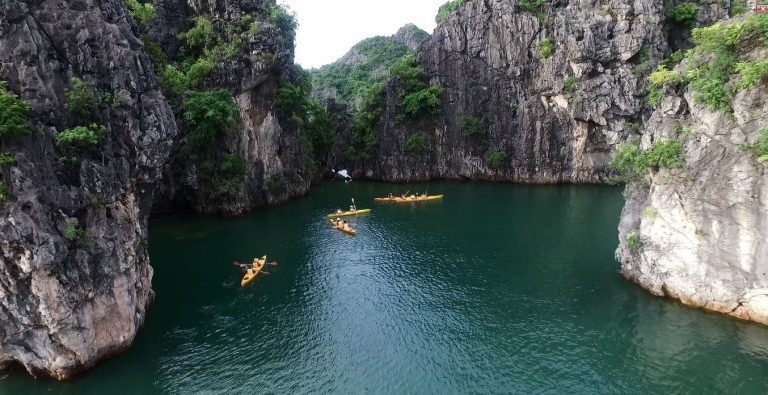
HALONG BAY
Halong Bay is one of Vietnam’s most stunning attraction – there is no way to describe Halong Bay other than as purely breathtaking. As a UNESCO World Heritage Site and natural wonder of the world, the bay features thousands of limestone islands, amazing caves and cliffs emerging from the turquoise sea.
Halong Bay sits off Vietnam’s northeastern coast, 165 km (3:30 hours) from the capital, Hanoi, and its incredibly serene emerald waters are home to multiple small limestone islands covered by rainforest. It is a popular spot for boat tours, both day trips and overnight cruises, cave exploration, booze cruises, and kayaking. So much that no trip to Vietnam would be authentic without visiting it.
The harbor of Halong Bay is situated in Tuan Chau Island. Halong Bay is one of the New Wonders of the World and tourists flock to sail its karsts-dotted waters. However, a few miles away there’s another bay – just as beautiful but minus the crowds.
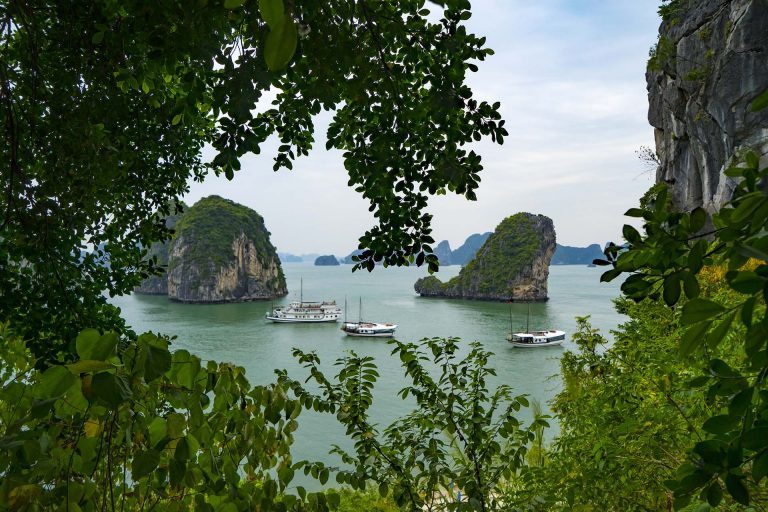
BAI TU LONG BAY
This off-the-beaten-path bay is Bai Tu Long Bay. If you opt for Bai Tu Long Bay, you will travel further. When you’ll reach the city and cross the Bai Chai Bridge, you will see the panorama of the bay and the Bai Tho Mountain before arriving at Vinashin port at 175 km (3:45 hours) from Hanoi.
If you choose to cruise the Bai Tu Long Bay, you might as well opt for the most luxurious and all-inclusive cruise there is. The 1930s echoing on the design, furniture, art collection and royal-like services on the first extravagant all-inclusive cruise operator in Bai Tu Long Bay, Emperor Cruises will make you feel like being treated as kings and queens from start to end in the exploration of this World Heritage Site.
Fun unlimited, abundant nature, entertainment anytime, adventure everywhere, food available all the time, All-Inclusive, All Luxury and All Time. Visit emperorcruises.com or call 24/7 Mrs. Nguyen +84-83-666-8879
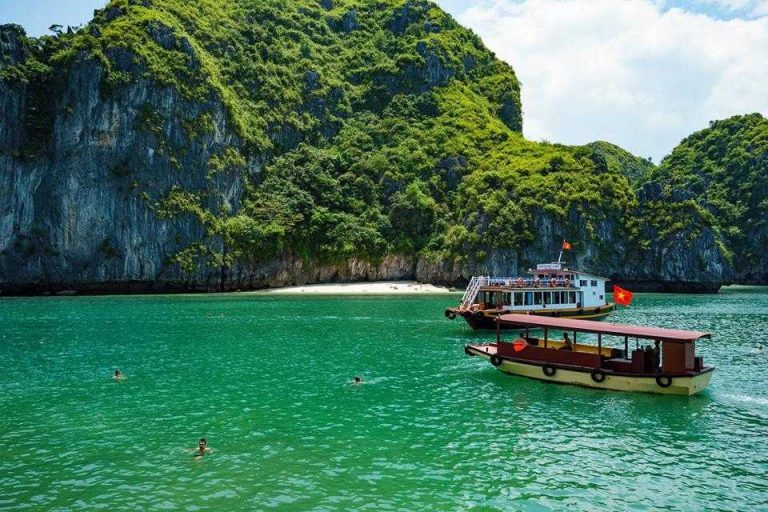
CAT BA ARCHIPELAGO AND LAN HA BAY
Authenticity is the buzzword for Cat Ba Archipelago and Lan Ha Bay. Traveling to Cat Ba by road cuts down to only 1.5 hours from Hanoi by the 5B Highway. Nowadays, travelers are more and more switching from Halong Bay to Cat Ba and Lan Ha Bay in increasing numbers. This place now is firmly in the developing phase; everything is just getting started. Lan Ha is tiny, and an amazing thing is that you can rent a cruise boat to explore the bay by yourself. This is excellent for those people who are self-confident and experienced and want a whole new kind of adventure. That is why foreseeing the amazing opportunity, we will launch Emperor Cruises Cat Ba Archipelago in 2019.
Conclusion
Travelers are seeking new and exotic experiences and plus value, whether it is in terms of personal value or value for money. They are looking for new destinations, new hotels, and new cruising experiences. They search for exclusivity and want to be the first to discover a destination. Many have moved towards a quieter understated luxury and plan their trips with a focus on authenticity and experiential travel, searching for particularly enriching once-in-a-lifetime experiences. For us, it is essentially about creating an experiential type of travel that is personal as well as authentic and memorable.
Halong Bay is understandably popular and crowded, but if you want to come experience it alone without other tourists, be sure to book our private charter boat that will sail where you want, cruising on your own itinerary. Go deep into the bay. Explore the caves and grottoes. Head over to Bai Tu Long Bay and Lan Ha Bay. Go trekking in the Cat Ba National Park, rock climbing, kayaking, and, watching some of the most amazing sunsets that you’ll ever set eyes on. The choice is yours.
I understand that for a two night cruise we will be transferred to a smaller boat while you go to pick up a new set of passengers. Do you have photo or a description of the smaller boat? Also, can you tell me how long we would wait to get back on the larger boat?
On the second day, you will have a chance to explore more and discover the other part of Halong bay and see the untouched caves, beaches and islands. You will board to a smaller boat and it is simpler for day use only. however, we made it more convenient by providing loads of sun chair, and everything you need, including food and drinks with chef. Our team will make sure you will have a wonderful adventure day on the water. Regarding to the time frame, you will leave EC boat at exactly 9AM, as we will explore and discover the other part of the bay, access to your room or other belongings will not be available until 3:30 pm. Here is the photos of the boats for your day offshore excursion.







